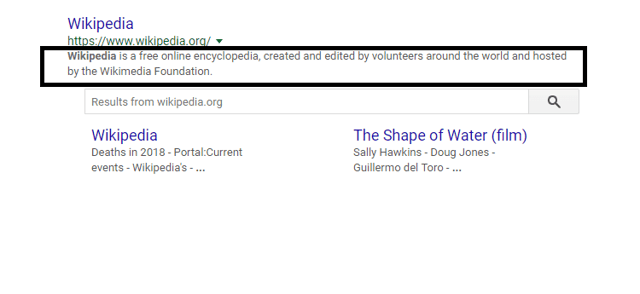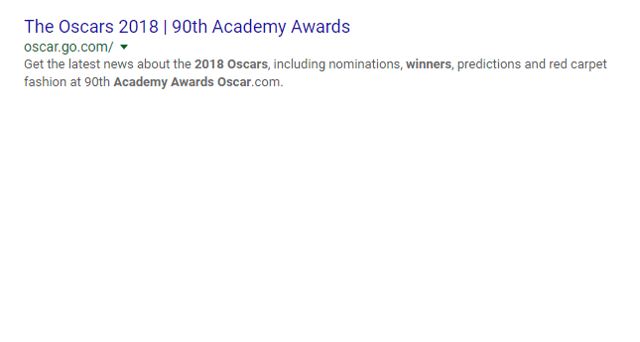One of the challenges of SEO content writing is making sure that you’re always up-to-date with the latest changes that search engines are making to their algorithms. A recent update by Google has increased the length of snippets in the search results, making it easier for searchers to see if the results are relevant to their interests.
What is the snippet? It’s the brief summary of a web page that’s displayed by a search engine to help users know if the result is relevant to what they’re looking for.
Here, you can see that Wikipedia’s snippet gives you a one-line description of who they are.

While the snippet is often the text contained in the meta tag in your HTML coding, this isn’t always the case. Search engines scan your content with the reader's query in mind, and if another section of your site better answers that query, the search engine's algorithm will grab that text and display it instead.
As you can see, it's important that you choose your meta description wisely so that you remain in control of the snippet shown beneath your URL in search results. Yet this choice isn't without restriction. Previously, the length limit for snippets was roughly 160 characters, which sometimes made it difficult for SEO content writers to summarize pages in compelling ways.
Thanks to the new limit, an expanded 320 characters, writers have significantly more real estate to let searchers know exactly what to expect when they click onto a page. There's still a good chance that Google will select on-site content for the URL's snippet instead of the meta description, so in general it may not be worth your time to revisit previously created meta descriptions and increase their length. However, going forward smart content writers will do their best to make use of this increased character count.
How Will Snippet Changes Impact Your Site?
What does this all mean for your business's site? On one hand, you now have a greater opportunity to entice readers to click your link. A longer character count means more room to include your primary keywords in the meta description.
We've known since 2009 that keywords in your meta description don't impact your ranking, but they do signal to readers that your content answers their questions. And when browsers are confident you have the information they're seeking, they're more likely to reward you with their traffic.
At the same time, more information available on the search engine results page (SERP) may result in a slightly lower click-through rate (CTR). After all, when the searcher's question is clearly answered on the SERP, he or she might not be motivated to read on.
That's why it's more important than ever to put a focus on great content, from meta descriptions to landing pages and blog posts. By taking full advantage of the expanded snippet length and publishing only first-rate content, you'll have a far better chance of attracting readers via your displayed snippet, whether it's taken from your meta description or your on-site pages.
Make Optimized Meta Descriptions a Priority When Buying SEO Articles
Even if Google pulls great content from your pages, it's still preferable to have your chosen meta description display on the SERP. That's because you want to retain as much control as possible over the first impression searchers get of your site, and thus, your business.
Unfortunately, Google keeps the specifics of their algorithms locked away, so there aren’t any hard and fast rules for SEO content writers to follow. Still, experience suggests that there are a few ways for brands to optimize meta descriptions for a better chance of display.
1. Monitor the Length
Take full advantage of the extended snippet character count to craft rich, engaging meta descriptions. That being said, stick within the known limits – there's no point in creating content that will only be cut off.
2. Include Keywords
If the meta includes the words used by the searcher, it’s far more likely to be used as the snippet. Google will also automatically highlight keywords, attracting attention from the reader and hopefully enticing a click. Search engines are also smart enough to include common variations on the terms.

For example, a search for “2018 Oscars results” will also highlight terms like “Academy Awards” and “winners”. Because of this, it's important that meta descriptions, like all content, are clearly topical.
3. Include A Call To Action
Your meta ultimately acts as an ad for your page. It should tell searchers what the benefits of going to your site are and give them a good reason to click on the result. Try introducing one of your offers, such as a free trial or downloadable resource, and add a short call to action to help boost your CTR. This is an easy way to provide value to your potential visitor.
It might be tempting to neglect meta descriptions, since they won't directly influence your SERP ranking. However, that's only part of the picture, and without strong meta descriptions you're ignoring a great opportunity to influence CTRs and the first impression your content makes on your potential site visitors. Keep the importance of meta descriptions in mind the next time you buy SEO articles or create your own – after all, you only get one chance to make a first impression that might ultimately win conversions.
Not sure that you have the time to monitor all of Google’s changes? Virtucom Group’s content packages are created by expert writers who know how to jumpstart your SERP rankings. Pick a package that meets the needs of your business to ensure you have quality content designed to drive conversions and build brand loyalty.






